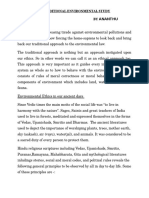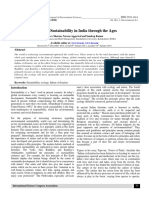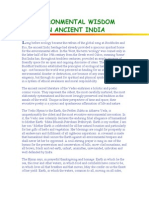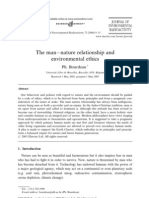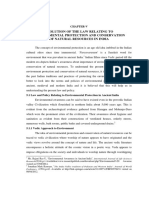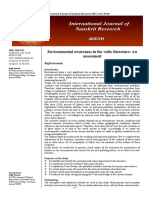0 ratings0% found this document useful (0 votes)
5 viewsAncient Environmental Ethics
Ancient Environmental Ethics
Uploaded by
Aadya BansalAncient Environmental Ethics ppt
Copyright:
© All Rights Reserved
Available Formats
Download as PPTX, PDF, TXT or read online from Scribd
Ancient Environmental Ethics
Ancient Environmental Ethics
Uploaded by
Aadya Bansal0 ratings0% found this document useful (0 votes)
5 views23 pagesAncient Environmental Ethics ppt
Copyright
© © All Rights Reserved
Available Formats
PPTX, PDF, TXT or read online from Scribd
Share this document
Did you find this document useful?
Is this content inappropriate?
Ancient Environmental Ethics ppt
Copyright:
© All Rights Reserved
Available Formats
Download as PPTX, PDF, TXT or read online from Scribd
Download as pptx, pdf, or txt
0 ratings0% found this document useful (0 votes)
5 views23 pagesAncient Environmental Ethics
Ancient Environmental Ethics
Uploaded by
Aadya BansalAncient Environmental Ethics ppt
Copyright:
© All Rights Reserved
Available Formats
Download as PPTX, PDF, TXT or read online from Scribd
Download as pptx, pdf, or txt
You are on page 1of 23
Environmental Ethics
and their Significance in
the Contemporary Era
-Prof. (Dr.) Rajiv Khare
-Professor of Law,
National Law Institute University, Bhopal
Meaning of Environmental
Ethics
Ethics is a system of moral principles or rules of
conduct. Ethics means the science that “deals with
morals, morals correctness” – Oxford’s Advanced
Learner’s Dictionary
The principles of ethics which guide an individual
as to how to behave with the environment is known
as ‘environmental ethics’
Environmental Ethics in olden
Times
Since Vedic time the main motto of social life was
to live in harmony with Nature.
Vedas, Upnishads, Smritis and dharmas, the
literature of old times preached worshipful attitude
towards the nature including trees, water bodies,
sky, air etc.
Hindu religion enshrined a respect for Nature,
environmental harmony and conservation.
Environmental Ethics in Hinduism
Dharma, one of the most important Hindu concepts,
has been translated into English as duty, virtue, cosmic
order and religion. In Hinduism, protecting the
environment is an important expression of dharma.
According to one indigenous theory Pancha
Mahabhutas (The five great elements) create a web of
life.
Hinduism teaches that the five great elements (space,
air, fire, water and earth) that constitute the
environment are all derived from prakriti, the nature.
Each of these elements has its own life and form;
together the elements are interconnected and
interdependent.
Many verses in Rigveda and Athar Veda devoted to
the praise of Nature:, viz, Prithvi Mata, Lord Surya,
Vayu Devta, Agni Devta .
Cuttingof trees, polluting air, water, land were
considered as sin as they were regarded as Gods and
Goddesses.
Rigveda,Manusmriti and Charak Samhita
emphasised on purity of water and healing &
medicinal value of water
Treeswere considered indispensable for human
beings, bestowers of good and protectors from evil.
In Rigveda, Aranyani Sukta has addressed to the deity
of forest and Oshadhi Sukta cautioned that they
should not be destroyed.
Rgveda emphasised on the healing properties of plants
and herbs.
Matasya Puran has regarded plantation of one tree
equal to 10 sons.
According to Varha Puran, “one who plants one
peepal, one neem, one ber and ten flowering plants
or creepers, two pomegranates, two oranges and
five mango trees will not go to hell”
Further, Rigveda acknowledged Air as one of the
deities and mentioned that “Let wind blow in the form
of medicinal value.”
Considered as abode of various Gods and Goddesses.
Name of trees associated with
Gods and Goddesses in Rigveda:
Name of the tree Gods
Ashoka Buddha, Indra
Fig Vishnu, Rudra
Kadamb Krishna
Lotus Laxmi
Mango Govardhan
Neem Sitala, Mansa
Palasa Brahma, Gandharva
Peepal Vishnu, Krishna
Vata (Banyan) Brahma
Names of Animals Associated
with Gods & Goddesses
Name of animal/ bird Name of God/ Godess
Bull Sitla
Crocodile Ganga
Eagle Vishnu
Elephant Indra, Ganesh
Lion Durga
Monkey Hanuman, Ram
Owl Laxmi
Peacock Kartikeya, Saraswati
Rat Ganesh
Serpent Shiva
Swan Saraswati
The Atharvaveda
Talks about the relation of plants with earth, “the
earth is keeper of creation, container of forests,
trees and herbs… plants are also forms of life…one
tree is equal to ten sons”
Yajurveda
Animals and birds have also been accepted as part
of nature and environment. It has also been warned
that animals should be safe, protected and healthy.
Manusmriti, has prescribed various punishments
for destroying trees and plants.
Charaka Samhita has considered the destruction of
forests as the most dangerous act for humanity and
its welfare.
Itfurther, specifically mentioned air pollution as a
cause of many diseases.
It also prohibits the use of unwholesome water.
Environmental Ethics in Islam
Quran contains passages that alternate between
themes of exploitation of nature for human pleasure
and themes of responsible stewardship over what
ultimately remains is the property of God, and not
humans.
Naturefunctioned as the means through which God
communicated to humanity, the means through
which, one may say, God made an entry into the
flow of time.
Environmental Ethics in
Christianity
The story of Noah and the flood gives (Genesis:
6:122) the lesson that consequences of sins by man
is not only to man but also to all creatures
The relation between environment and man from
the Christian perspective can be characterized from
three perspectives:
(1) Man's dominion over nature
(2) Man's participation in nature and
(3)Man's stewardship of natural environment
General Ethical Principles
Respect Nature;
Dependence of human life on components of Nature;
To keep harmony with Nature;
To protect natural environment and safeguard wildlife;
Utilise resource s only to satisfy needs;
Presence of divinity of nature in all living and non-living
objects;
Destruction of nature means destruction of mankind;
To have compassion for animate objects;
Man is one of the creation of God like other forms of life
and thus has no special privilege or authority;
Drought, floods, storms, tsunamis, earthquakes are violent
form of anger manifested by Gods and Goddesses.
Environmental Ethics Revisited:
The Constitution of India, 1950
The Constitution (Forty Second Amendment) Act,
1976 inserted 2 important provisions-
Article 48A- “State shall endeavour to protect and
improve the environment and to safeguard the
forests and wildlife of the country”
Article 51A(g)- “It shall be duty of every citizen of
India to protect and improve the natural
environment including forests, lakes, rivers and wild
life and to have compassion for living creatures.”
Article 48A and Article 51A(g) directs State and
‘We the citizens of India’ to ‘protect and improve
environment which implies:
Protection of environment – empathically direct us
not to cut trees and to keep water of rivers, lakes
etc.; and
Improvement of environment – implies the
improvement of natural environment and
improvement of quality of life.
The language used in these provisions clearly
indicates the principle of equity, co-existence and
reverence for nature and non-violence.
Judiciary and Environmental
Ethics
F.K. Hussain v. Union Of India
AIR 1990 Ker 321
Water and rivers have dominated the destiny and
fortunes of man. Plentiful rivers, have brought
prosperity to those who lived on their banks. Great
civilisations, going back to India's immemorial past,
flourished along the banks of our great rivers.
Regards and lores, linger around them. Along the
banks of Indus and Ganges grow up the greatest
civilisations, that mankind know of. If Bhageerathi
brought salvation, Ganga sustains life. The Ganga
rising in torrential springs from the foothills of
Himalayas, runs like lifeline through India's
Heartland and has brought plenty and prosperity.
Ages have rolled by it, and it has remained eternal…
T. Damodar Rao v Special
Officer Municipal Corporation,
Hyderabad, AIR 1987 A.P. 171
Environmental law is based on the realisation of
mankind of the dire physical necessity to preserve
these invaluable and none too easily replenish able
gifts of mother nature to man and his progeny from
the reckless wastage and rapacious appropriation
that common law permits…
Sachidananda Pandey v. State
Of West Bengal
AIR 1987 SC 1109
"You must teach your children that the ground beneath
their feet is the ashes of our grandfathers. So that
they will respect the land. Tell your children
that the earth is rich with the lives of our kin. Teach
your children what we have taught our
children, that the earth if sun mother. Whatever
befalls the earth befalls the sons of the earth. If men
spit upon the ground, they spit upon themselves.
"This we know: The earth does not belong to man;
man belongs to the earth. This we know: All things
are connected-like the blood which unites one
family. All things are connected…
Contd…
"Whatever befalls the earth befalls the sons of the earth.
Man did not weave to web of life: he is merely a strand
in it. Whatever he does to the web he does to himself.
"Even the white man, whose God walks and talks with
him as friend to friend, cannot be exempt from the
common destiny. We may be brothers after all. We shall
see. One thing we know, which the white man may one
day discover-our God is the same God. You may think
now that you own Him as you wish to own our land; but
you cannot. He is the God of man, and His compassion
is equal for the red man and the white. This earth is
precious to Him, and to harm the earth is to heap
contempt on its Creater. The white too shall pass;
perhaps sooner than all other tribes. Contaminate your
bed and you will one night suffocate in your own waste…
M.C. Mehta v. Union Of India
AIR 1988 SC 1037
In order to rouse amongst the people the
consciousness of cleanliness of environment the
Government of India and the Governments of the
States and of the Union Territories may consider the
desirability of organising 'Keep the city clean'
week (Nagar Nirrnalikarana Saptaha), 'Keep the
town clean week (Pura Nirmalikarana saptaha) and
'Keep the village clean week (Grama Nirmalikarna
Saptaha) in every city, town and village throughout
India at least once a year. During that week the
entire city, town or village should be kept as far as
possible clean, tidy and free from pollution of land,
water and air…
T.N.Godavarman Thirumalpad
v.
Union of India
AIR 2003 SC 724
Radhkrishnan, J. :
“Since time immemorial, natural objects like rivers
enjoyed a high position in the life of the society. They
were considered as goddesses having not only the
purifying capacity but also self-purifying capacity but
also self-purifying ability…the dharma of environment
was to sustain and ensure progress and welfare of all.
The inner urge of the individuals to follow the set
norms of the society, motivated them to allow the
natural objects to remain in natural state…”
Thank You !
You might also like
- Hinduism and Nature - Nanditha KrishnaDocument237 pagesHinduism and Nature - Nanditha KrishnaKelsie Jackson100% (4)
- Bhoomi SuktamDocument5 pagesBhoomi SuktamRam Mohan100% (1)
- Biodiversity in HINDUISM Leaflet-Print-CTPDocument12 pagesBiodiversity in HINDUISM Leaflet-Print-CTPspathak1.mauNo ratings yet
- Environmental LawDocument4 pagesEnvironmental LawAnanthu SureshNo ratings yet
- Environment Conservation in Ancient India: DR Renu TanwarDocument4 pagesEnvironment Conservation in Ancient India: DR Renu TanwarShailuSreeNo ratings yet
- Environmental Ethics in The Hindu Vedas and PuranasDocument3 pagesEnvironmental Ethics in The Hindu Vedas and PuranasShalini Dhal0% (1)
- EnvironmentDocument4 pagesEnvironmentSrini VasaNo ratings yet
- Environment Friendly Life Styles A Dialogue With Ancient IndiaDocument18 pagesEnvironment Friendly Life Styles A Dialogue With Ancient IndiaAnonymous LsyWN2oJNo ratings yet
- Environmental Protection and Water Reverence in Vedic Culture - by K.N. Sharma, Secretary, ICIDDocument8 pagesEnvironmental Protection and Water Reverence in Vedic Culture - by K.N. Sharma, Secretary, ICIDaangiras75% (4)
- Saving The Environment in The Light of Ancient Indian Thought-Nanditha-KrishnaDocument11 pagesSaving The Environment in The Light of Ancient Indian Thought-Nanditha-Krishnaspathak1.mauNo ratings yet
- Environment Protection in Ancient ScripturesDocument14 pagesEnvironment Protection in Ancient ScripturesVibhuNo ratings yet
- Indian Culture and Environmental ProtectionDocument3 pagesIndian Culture and Environmental ProtectionShankar PillaiNo ratings yet
- Environmental Law Module 1Document46 pagesEnvironmental Law Module 1Tejas DorgeNo ratings yet
- 09 - Chapter 3Document73 pages09 - Chapter 3shivamNo ratings yet
- Pancha Mahabhut - and It's Effect On Nature and World PeaceDocument9 pagesPancha Mahabhut - and It's Effect On Nature and World PeaceNihar Ranjan AcharyaNo ratings yet
- 09 - Chapter-2 - Environmental Law and Policy-International PerspectiveDocument44 pages09 - Chapter-2 - Environmental Law and Policy-International PerspectiveYuvika DhimanNo ratings yet
- Ecological Sustainability in India Through The Ages: Review PaperDocument4 pagesEcological Sustainability in India Through The Ages: Review PaperHANDS UPNo ratings yet
- Environmental Concept in Indian Thoughts.Document4 pagesEnvironmental Concept in Indian Thoughts.Dr. Nitish PriyadarshiNo ratings yet
- 9 Jerad DLId 0636 Vol 004 Issue 0021Document8 pages9 Jerad DLId 0636 Vol 004 Issue 0021Abhinav ShuklaNo ratings yet
- Protection of Environement in Ancient and British IndiaDocument8 pagesProtection of Environement in Ancient and British IndiaKarmendra NarainNo ratings yet
- Historical Evolution: of Environmental LWDocument38 pagesHistorical Evolution: of Environmental LWAnirudh AroraNo ratings yet
- Assignment - 1 - Ancient LawDocument4 pagesAssignment - 1 - Ancient LawbhagNo ratings yet
- Enviornmental Conservation in Ancient IndiaDocument4 pagesEnviornmental Conservation in Ancient Indiaashim royNo ratings yet
- Environmental EthicsDocument5 pagesEnvironmental Ethicsaakaankshaagupta20No ratings yet
- Lecture 4Document19 pagesLecture 4Prem KavathiyaNo ratings yet
- Environmental NotesDocument37 pagesEnvironmental NotesMadhav VyasNo ratings yet
- Ancient Indian Perspective On EnvironmentDocument10 pagesAncient Indian Perspective On EnvironmentAnirban DeNo ratings yet
- AbstractDocument8 pagesAbstractTriptiNo ratings yet
- Ecological Concerns in Mahabharata: DR - RajanijairamDocument3 pagesEcological Concerns in Mahabharata: DR - RajanijairamMohammad ShoebNo ratings yet
- Environmental WisdomDocument3 pagesEnvironmental Wisdomrahulpatel27No ratings yet
- Buddhism & Environmental ConservationDocument30 pagesBuddhism & Environmental Conservationapi-3817018100% (1)
- Applied-The Impact-Udai Narain SinhaDocument8 pagesApplied-The Impact-Udai Narain SinhaImpact JournalsNo ratings yet
- IIAS AbstractDocument2 pagesIIAS AbstractRichard NicetasNo ratings yet
- Ecotheology AssignmentDocument5 pagesEcotheology AssignmentkevinNo ratings yet
- Vedic Perspective On EnvironmentDocument2 pagesVedic Perspective On EnvironmentaangirasNo ratings yet
- The Man-Nature RelationshipDocument7 pagesThe Man-Nature Relationshipniil2No ratings yet
- Vedic Solutions To Modern ProblemsDocument6 pagesVedic Solutions To Modern Problemsrahul1nayanNo ratings yet
- Concepts of EnvironmentDocument6 pagesConcepts of EnvironmentShailendra TripathiNo ratings yet
- Concept of Environment in AIDocument6 pagesConcept of Environment in AIshishir balekarNo ratings yet
- Religion and EnvironmentDocument15 pagesReligion and EnvironmentjinNo ratings yet
- Primal Visions and EthosDocument11 pagesPrimal Visions and EthossindhujapreslyNo ratings yet
- Transition of Hindu Environmental EthicsDocument11 pagesTransition of Hindu Environmental Ethicskritika MahatoNo ratings yet
- Joining Both Palms Together To GreetDocument4 pagesJoining Both Palms Together To Greetanita mahajanNo ratings yet
- Paper III - Notes 1 - Environment & Development - Law and PolicyDocument91 pagesPaper III - Notes 1 - Environment & Development - Law and PolicyRaj TamhankarNo ratings yet
- Virginius XAXA-OraonsReligionCustoms-1992Document11 pagesVirginius XAXA-OraonsReligionCustoms-1992Siya PandeyNo ratings yet
- Chapter-1 Introduction and Historical BackgroundDocument49 pagesChapter-1 Introduction and Historical BackgroundDevanshu YadavNo ratings yet
- Muhammad Tikka Research PaperDocument10 pagesMuhammad Tikka Research PaperHamza TikkaNo ratings yet
- Chapter-2 History of Environmental Degradation in IndiaDocument27 pagesChapter-2 History of Environmental Degradation in Indiachandni babunuNo ratings yet
- Sociology of Literature Mid Exam Part 1 2, Edzi Dwi Pratama Syachrukh RamadhanDocument10 pagesSociology of Literature Mid Exam Part 1 2, Edzi Dwi Pratama Syachrukh RamadhanEdzi DwiNo ratings yet
- 06 - Chapter 2 PDFDocument28 pages06 - Chapter 2 PDFPonvel Kumaran K BNo ratings yet
- EnvironmentManagementinAncientIndia-Dr KamnaVimalSharmaDocument8 pagesEnvironmentManagementinAncientIndia-Dr KamnaVimalSharmaarts.kalaakritiNo ratings yet
- M.chapter-V Evolution of The Law Relating To Environmental P-1Document14 pagesM.chapter-V Evolution of The Law Relating To Environmental P-1Manik Singh KapoorNo ratings yet
- Environment Law AssignmentDocument20 pagesEnvironment Law AssignmentKamlesh raiNo ratings yet
- Sanskrit 12 1 2 28Document4 pagesSanskrit 12 1 2 28Shalini DhalNo ratings yet
- Ecological Concern in MahabharataDocument3 pagesEcological Concern in MahabharataHmingsanga Chhakchhuak100% (1)
- Ways of Spirituality for the Earth SustainabilityFrom EverandWays of Spirituality for the Earth SustainabilityRating: 5 out of 5 stars5/5 (1)
- Unit 1, Intro To EVSDocument17 pagesUnit 1, Intro To EVSArsha TanejaNo ratings yet
- Jasrae Issue 4 Vol 16 211192Document7 pagesJasrae Issue 4 Vol 16 211192ashishgupta93No ratings yet
- Legy 101Document7 pagesLegy 101dwaragnathNo ratings yet
- 011 - Origin and Growth of Environmental Law in India (358-387) PDFDocument30 pages011 - Origin and Growth of Environmental Law in India (358-387) PDFChetan SinghNo ratings yet



